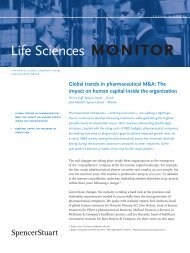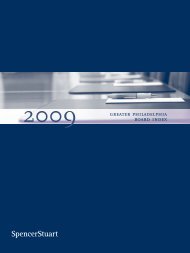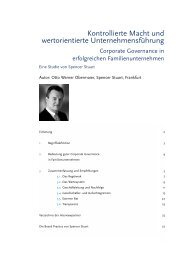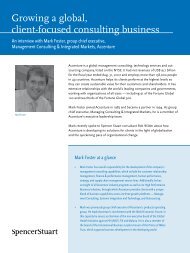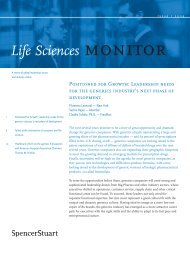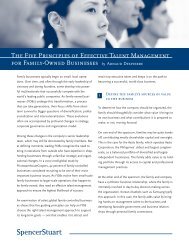the corporate treasurer Takes Center Stage - Spencer Stuart
the corporate treasurer Takes Center Stage - Spencer Stuart
the corporate treasurer Takes Center Stage - Spencer Stuart
You also want an ePaper? Increase the reach of your titles
YUMPU automatically turns print PDFs into web optimized ePapers that Google loves.
<strong>the</strong> <strong>corporate</strong> <strong>treasurer</strong><br />
<strong>Takes</strong> <strong>Center</strong> <strong>Stage</strong><br />
The global economic crisis of <strong>the</strong> past two years has transformed <strong>corporate</strong><br />
priorities, pushing financial risk management to <strong>the</strong> top of <strong>the</strong> list. In turn, this<br />
shift has raised <strong>the</strong> profile of <strong>the</strong> executive often responsible for managing that risk:<br />
<strong>the</strong> <strong>corporate</strong> <strong>treasurer</strong>.<br />
“The changes in <strong>the</strong> focus of <strong>the</strong> <strong>treasurer</strong> over <strong>the</strong> last year have been nothing short<br />
of seismic,” said Jamie Smith, group head of tax and treasury for manufacturer Smiths<br />
Group. “Historically, <strong>treasurer</strong>s have been seen as important, but ra<strong>the</strong>r hidden. But<br />
treasury and risk are now permanently on <strong>the</strong> board’s agenda.”<br />
Today, <strong>treasurer</strong>s spend considerably more time in senior management meetings<br />
and before <strong>the</strong> board than ever before. In financial companies, “boards are being<br />
questioned more by regulators and need a more sophisticated understanding of<br />
credit and market risk,” said Hugh Graham, director of treasury and <strong>corporate</strong> finance<br />
for Nor<strong>the</strong>rn Rock. “Treasury is being scrutinized far more than it used to be, and<br />
this has raised <strong>the</strong> profile of <strong>the</strong> new <strong>treasurer</strong>.” At Smiths Group, <strong>the</strong> treasury team<br />
has even implemented a new treasury reporting system to give <strong>the</strong> board access to<br />
more information.<br />
Treasurers have also been working more closely with CFOs ever since risk and cash<br />
flow management have become greater <strong>corporate</strong> priorities. “The CFO has to be<br />
critically involved in <strong>the</strong> discussion around <strong>the</strong> balance sheet and risks, and cannot<br />
just be focused on investor relations,” said Smith. “Our CFO now probably spends a<br />
quarter of his time on treasury issues.”
<strong>the</strong> <strong>corporate</strong> <strong>treasurer</strong> takes center stage<br />
<strong>the</strong> new <strong>treasurer</strong><br />
Before <strong>the</strong> crisis, <strong>the</strong> prevailing treasury trend was<br />
to concentrate on benchmarking and on best-in-class<br />
systems processes and controls. “That works in<br />
a steady-state environment. But when <strong>the</strong> market<br />
started to collapse, it became all about market<br />
dynamics and risk management,” said Adil Mistry,<br />
<strong>treasurer</strong> for Toys“R”Us.<br />
“In today’s environment, it’s all about access to liquidity,<br />
and <strong>the</strong>re’s a greater focus on debt covenants,”<br />
said Irene Moshouris, vice president and <strong>treasurer</strong><br />
for United Rentals. Because of her status as a point<br />
person on financial risks, Moshouris has been named<br />
co-chair of United Rentals’ enterprise risk management<br />
committee. The group ga<strong>the</strong>rs colleagues from<br />
different departments, from HR to IT, to develop an<br />
enterprise-wide view of risks to <strong>the</strong> organization and<br />
reports on <strong>the</strong>m to senior management and <strong>the</strong> board.<br />
To better manage risk, most <strong>treasurer</strong>s have chosen<br />
to run a very conservative treasury operation in<br />
response to <strong>the</strong> economic crisis. Once <strong>the</strong> credit<br />
markets started to open up in late summer 2009,<br />
<strong>the</strong>y started to consider refinancing. “To <strong>the</strong> extent<br />
that you could remove refinancing risk from your<br />
balance sheet, you were rewarded by <strong>the</strong> market,”<br />
said Mistry.<br />
But even though green shoots for <strong>the</strong> economy<br />
are appearing, <strong>treasurer</strong>s haven’t entirely changed<br />
<strong>the</strong>ir approach just yet. “I sense a feeling of mute<br />
optimism,” said Sean Christie, group <strong>treasurer</strong> for<br />
AstraZeneca. “People are less defensive, but I still<br />
think <strong>treasurer</strong>s now are more conservative than<br />
<strong>the</strong>y used to be.”<br />
a changing skill profile<br />
In fact, most <strong>treasurer</strong>s view <strong>the</strong> volatile markets of<br />
<strong>the</strong> past few years as less of an aberration than as a<br />
new reality <strong>the</strong>y must be prepared to navigate. “When<br />
I recruit for my team now, I am looking for people<br />
who can react to a rapidly shifting landscape,” said<br />
Graham. “I want broad business thinkers and people<br />
who have been stress tested.”<br />
In this environment, traditional areas of focus for<br />
<strong>treasurer</strong>s, such as cash management, have become<br />
sidelines. As a result, <strong>the</strong> traditional treasury operations<br />
skill set is less in demand, while savvy in capital<br />
markets has become increasingly critical.<br />
Meanwhile, as <strong>the</strong> need for comprehensive, real-time<br />
information for decision-making has increased, so<br />
has <strong>the</strong> use of technology tools for decision support.<br />
In turn, IT understanding has also become more<br />
valued in <strong>the</strong> treasury role. But while <strong>treasurer</strong>s should<br />
be able to bridge <strong>the</strong> application of technology to <strong>the</strong><br />
treasury operation, having a current understanding of<br />
treasury concepts and trends remains far more important<br />
than technical IT skills.<br />
<strong>the</strong> treasury career path<br />
While <strong>the</strong> <strong>treasurer</strong> role is often a stepping stone<br />
to CFO in <strong>the</strong> banking and finance industries,<br />
<strong>treasurer</strong>s don’t necessarily see <strong>the</strong> recent focus<br />
on treasury as a trend that will open up new career<br />
opportunities to <strong>the</strong>m. Some even feel that it may<br />
even be more difficult for <strong>treasurer</strong>s to move beyond<br />
<strong>the</strong> role right now because <strong>the</strong>y’re so indispensible<br />
in <strong>the</strong>ir current position.<br />
O<strong>the</strong>rs see <strong>the</strong> role as a great proving ground, but<br />
acknowledge that a vertical move is only realistic for<br />
those who break outside of <strong>the</strong> treasury silo, since<br />
good exposure to financial planning and analysis<br />
and control are also common requirements for <strong>the</strong><br />
CFO role.<br />
Today, a number of blue-chip companies deliberately<br />
rotate executives through <strong>the</strong> treasury function, as well<br />
as through operations and o<strong>the</strong>r departments, to<br />
groom future leaders. “I am not a career <strong>treasurer</strong>,”<br />
said Anna Manz, group <strong>treasurer</strong> for Diageo. “I was
<strong>the</strong> <strong>corporate</strong> <strong>treasurer</strong> takes center stage<br />
put into treasury both to round off my skill set, and also<br />
because treasury now requires a broader type of person.<br />
You need to be nimble, stress tested, broadly focused,<br />
understand <strong>the</strong> business and all its elements,<br />
and you must add value.”<br />
moving beyond crisis<br />
As <strong>the</strong> economy improves, many <strong>treasurer</strong>s expect<br />
to spend <strong>the</strong> next few years focused on balance sheet<br />
repair. “Treasurers have got <strong>the</strong> bulk of <strong>the</strong> risk behind<br />
<strong>the</strong>m, but it’s come with a cost,” Mistry said. “I think<br />
<strong>the</strong> next wave will be <strong>treasurer</strong>s trying to claw back to<br />
regain a more malleable balance sheet.”<br />
Despite <strong>the</strong> current attention on <strong>the</strong> function, some<br />
<strong>treasurer</strong>s view <strong>the</strong> role as cyclical, and expect <strong>the</strong> focus<br />
on treasury to ebb as <strong>the</strong> financial crisis fades. But o<strong>the</strong>rs<br />
feel that <strong>the</strong> downturn has permanently changed<br />
both <strong>the</strong> way that companies manage risk and <strong>the</strong> <strong>treasurer</strong>’s<br />
role.<br />
“The whole funding and liquidity landscape has<br />
changed,” said Christie. “Traditional assumptions<br />
around assessing liquidity have changed. We have<br />
to look more closely at our backup facilities, at how<br />
<strong>the</strong> bond markets are reacting, at <strong>the</strong> credit worthiness<br />
of counterparties. We need to look more closely at<br />
where we put our money and how safe it is. The level<br />
of scrutiny is just far higher — and I think it’s here<br />
to remain.”<br />
about <strong>the</strong> authors<br />
Joel von Ranson, based in New York, is a member<br />
of <strong>Spencer</strong> <strong>Stuart</strong>’s Financial Officer Practice. He<br />
focuses on search assignments for CFOs, <strong>treasurer</strong>s,<br />
controllers and o<strong>the</strong>r financial executive searches<br />
across a broad range of companies.<br />
James Colhoun, based in London, heads <strong>Spencer</strong><br />
<strong>Stuart</strong>’s Financial Officer Practice in <strong>the</strong> U.K. He specializes<br />
in recruiting CFOs and <strong>treasurer</strong>s for FTSE 100<br />
and 250 businesses as well as for private companies.<br />
about <strong>the</strong> financial officer<br />
practice<br />
<strong>Spencer</strong> <strong>Stuart</strong>’s Financial Officer Practice<br />
understands <strong>the</strong> changing demands of <strong>the</strong><br />
financial officer marketplace and helps clients<br />
recruit established senior executives and rising<br />
stars with <strong>the</strong> unique qualifications and leadership<br />
traits to fulfill <strong>the</strong> most demanding roles.<br />
The Financial Officer Practice specializes in<br />
placing chief financial officers and o<strong>the</strong>r top<br />
financial executives, including <strong>the</strong> senior leaders<br />
in audit and control, <strong>corporate</strong> development,<br />
investor relations, tax and treasury. The practice<br />
serves clients from Fortune 500, FTSE Eurotop<br />
300, FTSE 100, DAX 30, CAC 40 and HS 100<br />
companies to private equity firms, portfolio<br />
companies and nonprofit organizations.<br />
about spencer stuart<br />
<strong>Spencer</strong> <strong>Stuart</strong> is one of <strong>the</strong> world’s leading<br />
executive search consulting firms. Privately<br />
held since 1956, <strong>Spencer</strong> <strong>Stuart</strong> applies its<br />
extensive knowledge of industries, functions<br />
and talent to advise select clients — ranging<br />
from major multinationals to emerging companies<br />
to nonprofit organizations — and address<br />
<strong>the</strong>ir leadership requirements. Through 51 offices<br />
in 27 countries and a broad range of practice<br />
groups, <strong>Spencer</strong> <strong>Stuart</strong> consultants focus on senior-level<br />
executive search, board director appointments,<br />
succession planning and in-depth senior<br />
executive management assessments. For more<br />
information on <strong>Spencer</strong> <strong>Stuart</strong>, please visit<br />
www.spencerstuart.com.<br />
© 2010 <strong>Spencer</strong> <strong>Stuart</strong>. All rights reserved. For information about copying, distributing and displaying this work, contact permissions@spencerstuart.com.<br />
Sign up to receive publications in your areas of interest via e-mail or RSS by visiting www.spencerstuart.com.




